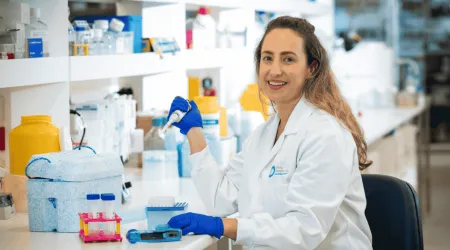
Married couple battling concurrent stage IV CRC diagnoses speaks at Denver Bash

The average odds of getting colorectal cancer in your lifetime are 1 in 24.
The average odds of getting it before you turn 45 are 1 in 240.
But, as Erik Stanley shared with Blue Hope Bash Denver guests this weekend, the odds of a married couple under 45 — who grew up 1,000 miles apart and without any genetic predisposition — both being diagnosed with stage IV colon cancer within two years are about 1 in 100 million.
That’s exactly what Erik and his wife, Kacie Peters, are facing today.
“Since our diagnoses, we’ve done over 100 hours of chemotherapy, had a dozen surgeries with more to come, and spent at least 65 nights away from home in the hospital,” Kacie told Bash guests.
“And we’ve done it all so that our 5-year-old son doesn’t have to grow up without us,” Erik added.
Kacie and Erik are extraordinary. Despite dual, concurrent diagnoses with stage IV colorectal cancer, they have risen to the challenges posed by this disease and continue to be incredible parents, accomplished professionals, and now, outspoken advocates for colorectal cancer.
They spoke at the Blue Hope Bash Denver on October 1 to encourage support for the Alliance’s mission and raise funds to research new treatments and find a cure.
You can support them in the cause by donating here.
The Alliance is the nation’s leading nonprofit dedicated to ending colorectal cancer. Through programs to screen, care, and cure this disease, we will end this disease in our lifetime.
Top resources

Where breakthroughs begin: Project Cure CRC spotlight on Dr. Lisa Mielke
hrough Project Cure CRC, the Alliance is fueling bold, early-stage research with the potential to transform colorectal cancer treatment. Dr. Lisa Mielke’s groundbreaking work explores how the gut’s immune system and nerve signaling influence cancer growth—opening the door to new therapeutic approaches, including repurposed existing drugs. This is what’s possible when promising ideas get the support they need to move forward.

National Cancer Prevention Month: Majority View Encouraging Screening as an Act of Love
Americans increasingly view colorectal cancer screening encouragement as an act of love, with new survey data showing rising openness about lifesaving prevention.

John E.: Biomarker testing uncovered a pivotal treatment option
After a grim prognosis, biomarker testing revealed a targeted treatment option for John E. Learn how knowing your biomarkers can change what’s possible.





